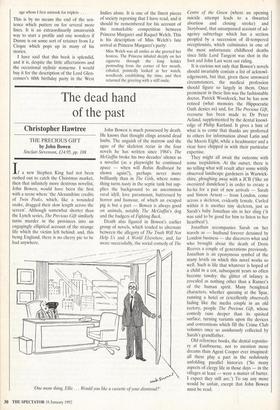The dead hand of the past
Christopher Hawtree
THE PRECIOUS GIFT by John Bowen
Sinclair-Stevenson, £14.95, pp. 188
If a new Stephen King had not been rushed out to catch the Christmas market, then that infinitely more dextrous novelist, John Bowen, would have been the first with a scene where 'the Alexandrine credits of Twin Peaks, which, like a wounded snake, dragged their slow length across the screen'. Although somewhat shorter than the Lynch series, The Precious Gift similarly turns murder in the provinces into an engagingly elliptical account of the strange life which the victim left behind; and, this being England, there is no cherry pie to be had anywhere.
John Bowen is much possessed by death. He knows that thought clings around dead limbs. The anguish of the marrow and the ague of the skeleton recur in the four novels he has written since 1984's The McGuffin broke his two decades' silence as a novelist (as a playwright he continued apace — when will Robin Redbreast be shown again?), perhaps never more brilliantly than in The Girls, where some- thing turns nasty in the septic tank but sup- plies the background to an uncommon rural idyll, love paramount, buttressed by horror and humour, of which an escaped pig is but a part — Bowen is always good on animals, notably The McGuffin's dog and the badgers of Fighting Back.
Death also figured in Bowen's earlier group of novels, which tended to alternate between the allegory of The Truth Will Not Help Us and A World Elsewhere, and, far more successfully, the social comedy of The 'One more thing, Ellis . . . Would you like a cassette of your dismissal?' Centre of the Green (where an opening suicide attempt leads to a thwarted abortion and closing stroke) and Storyboard, that unsurpassed account of ad- agency subterfuge which has a section peopled by a succession of ill-tempered receptionists, which culminates in one of the most unfortunate childhood deaths since little Lord Tangent was shot in the foot and John Last went out riding.
It is curious not only that Bowen's novels should invariably contain a list of acknowl- edgements, but that, given these untoward circumstances, the medical profession should figure so largely in them. Once prominent in these lists was the fashionable doctor, Patrick Woodcock, but he has now retired (what memoirs the Hippocratic Oath denies us) and, for The Precious Gift, recourse has been made to Dr Peter Acland, supplemented by the dental knowl- edge of Philip Kurland. It gives a hint of what is to come that thanks are proferred to others for information about Latin and the Morris Eight, while a headmaster and a vicar have chipped in with their particular expertise.
They might all await the outcome with some trepidation. At the outset, there is no telling what will result after some wittily observed landscape gardeners in Warwick- shire, ploughing away with a JCB (like an oversized dandelion') in order to create a ha-ha for a pair of new arrivals — Sarah and Simon Arnott — from London, come across a skeleton, evidently female. Curled within it is another tiny skeleton, just as Sarah's baby Jonathan sits in her sling ('it was said to be good for him to listen to her heartbeat').
Jonathan accompanies Sarah on her travels as — husband forever detained by London business — she discovers what and who brought about the death of Doris Reeves a couple of generations previously. Jonathan is an eponymous symbol of the many levels on which this novel works so well. Such is life that whatever is hoped of a child in a cot, subsequent years so often become tawdry: the glitter of infancy is revealed as nothing other than a Ratner's of the human spirit. Many benighted characters, whether queuing at the Spar, running a hotel or (excellently observed) fading like the media couple in an old rectory, people The Precious Gift, whose comedy runs deeper than its spirited surface, turning variants upon the devices and conventions which fill the Crime Club volumes once so assiduously collected by Sarah's grandfather.
Old reference books, the dental reposito- ry at Eastbourne, not to mention more dreams than Agent Cooper ever imagined: all these play a part in the sedulously unfolding parallel histories (`So many aspects of clergy life in those days — in the villages at least — were a matter of barter. I expect they still are.') To say any more would be unfair, except that John Bowen must be read.


















































 Previous page
Previous page